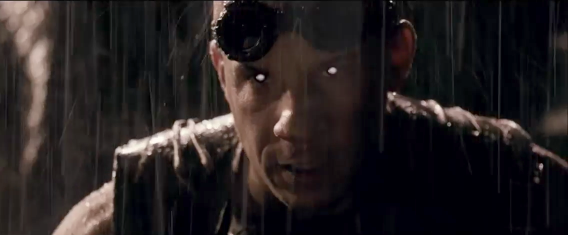Riddick (2013)
Something about comic books.
I was wandering around a suburban comic bookstore a couple of weeks ago, just killing time between errands, but I wound up spending over an hour exploring the shelves. I haven't been in a comic shop in almost a year, mostly for budget reasons. There are too many things to spend my money on and it would add up too quickly. Anyway, this got me thinking about what it means to make a comic book, more precisely an indie comic book. These comic artists are more or less in the same game as writers, musicians and filmmakers. There is a substantial investment of time and resources in something that offers no guarantee of payback. They put it out there, maybe it gets published, maybe it gets picked up by a distributor and maybe and ends up on a "New this Week" shelf next to fifty other titles.These shelves, when you stand a few feet back and take a wide view of the whole thing, looks a lot like a Netflix on-demand screen. Aren't those comic book panels just storyboards that are free of the constraints of physical production? Then it all came together, this is what the future looks like for filmmakers. The means of producing a film, a small film, but a narrative film nonetheless, will be not more expensive than that of creating a professionally published comic book. Filmmakers will put there films together, put them in a queue with only their cover art to help them find their audience. This is good, this is bad, but this is the future as much as it is the present in abstract.
You don't have be any kind of entertainment geek to see that comic books have taken over Hollywood; comic book franchise films are the tentpoles of the film season. You also don't have to too much of a geek to see that these films have very little to do with the comics that inspired them. Why should they? They are different forms with different audiences. Despite the visual kinship, one really has little to do with the other. A screenplay is as similar to a novel.
Thoughts on Riddick
I mention this because Riddick, like Dredd (2012), is a film that draws heavily on comic book sources in an engaging way. Despite all the stuff with space travel, it is a hybrid of high fantasy, science fiction and horror. Director David Twohy and Cinematographer David Eggby (his first DP gig was none other than Mad Max!) have created something very much like Heavy Metal magazine brought to luminous digital life. The images, from composition to color, could as easily been painted by Frazetta or Corben. When Riddick (Vin Diesel) is fending of space monster hordes, the imagery suggests other heroes and more traditional monsters. In the opening of the film, Riddick heals himself and evolves from barbarian to hunter to warrior. This sequence is not unlike Conan's journey from the wheel of pain. I don't think this is accidental. |
| It's a "space" dog, okay? |
There are some weak points though, some of the dialogue, like a comic book, tries too hard to be clever. A few too many would-be catch phrases distract from the pervasive tone that Twohy has gotten so good at creating for his Riddick films. Riddick's relationship with the "space" dog-hyena that he tames veers too far into cuteness. It was cool to see Riddick bonding with a wild animal, but it didn't need to go all Disney on us. The wraparound "mythology" story with the Necromongers feels like an afterthought by the end of the film. To return to the comic book parlance, this could have just as easily been a one-off rather than intertwined with a regular series.
 |
| Issue #2, alternate cover |



